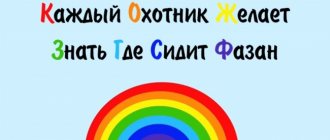Kozitsina S.V. Article "Reflective techniques at parent meetings"
Reflective techniques at parent meetings
.
It is advisable to end the parent meeting with an assessment that shows whether the expectations of its participants were met, what was especially significant for each of the participants, and what conclusions the parents drew for themselves. At the final stage of the parent meeting, it is important to find out whether the understanding of the issue under consideration has changed. Each of them must decide for himself what at the meeting reinforced his opinion, and what needs to be reviewed or changed in himself. This is reflection, that is, assessing oneself from the perspective of the issue under consideration. We will give specific techniques for conducting assessment, self-assessment, and reflection. A written answer to one of the questions of the participant’s choice:
“What new did you learn today?
What caught your attention at the meeting?
Which speech do you consider the most constructive and why?
What was difficult?
What hindered your work and why?”
There may be other questions - at the discretion of the teacher or the organizers of the parent meeting. Ball game.
One sentence answer to the question asked.
By accepting the ball, the parent gives the answer to the question posed. When he gives the ball back, he asks a question. Gesture of the day.
Sitting or standing, parents demonstrate their attitude to the results of the meeting with appropriate facial expressions or gestures.
Drawing of the day.
Parents express their attitude to the meeting with an appropriate drawing, explaining, if necessary, its meaning.
Word of the day.
It is proposed to express in one word your attitude towards the meeting.
Coordinate system.
A coordinate system is drawn on the board. Each parent must determine his point in this coordinate system - this will be his assessment of the meeting. On one axis, grades are marked by content, on the other - by organization.
Blitz survey.
The teacher asks questions about the topic of the parent-teacher conference, and parents give quick and short answers, answering as they wish.
Anonymous advice.
Each participant receives a card on which he writes advice to the teacher or other participants. You can offer to give advice in a humorous manner.
Exhibitions.
The work done by parents during the meeting is displayed at the stand.
Parents themselves make rationalization proposals for improving their work. They also evaluate the results of their activities. The teacher highlights the positive in each work and offers to compare the children’s work with the work of adults, highlighting the difficulties in completing tasks. A survey
of parents at the final stage of the meeting is carried out in order to give participants the opportunity to assess their knowledge on the issue discussed at the meeting and to evaluate the overall results of the parent meeting.
A typical parent-teacher conference participant.
The teacher invites parents to draw up a portrait of a typical representative of their group.
This could be a real portrait of the group, or it could be a joke. It all depends on the mood and desire of the parents. Both options can be offered. Pyramid of knowledge.
Parents build a pyramid of their knowledge acquired or expanded at the meeting. You can build a pyramid of positive emotions, interesting facts, useful information, original tasks, etc.
Reflection (self-analysis) can be carried out after each stage of the parent meeting, but it is most appropriate to do this at the end of the meeting. All parents take turns expressing their impressions of the meeting. The teacher encourages parents to speak out by asking: “What did you like most? What would you like to do differently? How has your attitude towards yourself changed? What valuable qualities of yours were you able to see at the meeting? What new knowledge and skills have you gained? What discoveries did you make for yourself during the meeting? What questions were easy for you to answer? What surprised you? What was useful for you personally?” Other questions may be asked. Their wording depends on the composition of the parent group and the topic of the parent meeting.
Self-analysis of personal qualities.
The teacher invites parents to think about what worries them most about themselves: relationships with children, appearance, style of behavior, demeanor, attitude of people, the results of their own activities, their inner world, etc. The number of signs, the signs themselves are determined by the parents together with the teacher.
All of them are recorded in a column. Participants need to rank the features, that is, put a number next to each feature. First, participants choose the most significant feature for them, it corresponds to the number 1, then the next one - 2, etc. Each participant will have their own order of numbers. You can determine the leading signs for this group of parents if you use the information received from each participant in the Crown of Knowledge
(skills, positive feelings, joyful moments, interesting ideas, communication, etc.). Participants in the parent meeting, intertwining their hands (for example, the right hand on the shoulder of the neighbor on the right, and the left hand on the belt of the neighbor on the left), make a wreath. At the same time, everyone talks about the positive things that happened at the meeting. The teacher says that this wreath allows the acquired knowledge and positive feelings not to crumble, but to grow stronger, leaning on the shoulder and experience of their new friends, the parents of this class of students. Every participant can always remember this.
Synthesis of information in concise terms.
Participants in the parent meeting are asked to describe everything that happens at the meeting in one word.
All words are recorded. Then it is proposed to compose a title from two words, then using a whole sentence that reveals the essence of the topic. Answer the question: “What am I grateful for today?” A wonderful casket
(suitcase, backpack, bag, briefcase, etc.). The teacher invites the class participants to answer what they would like to put in a wonderful casket and take with them into the future from the knowledge, skills and abilities acquired at this parent meeting.
Score by cards.
The stand or board is divided into three parts.
The first part will highlight everything that participants saw positive at the parent meeting. The second part should indicate what did not satisfy their requests. The third part will contain proposals for further improvement of parent meetings. Each participant receives three cards corresponding to the three sections of the stand and fills them out in large letters. Score cards are placed on the stand. The answers received can, if desired, be discussed with the whole group. You don’t have to do this, since the answers speak for themselves. A survey or written questionnaire based on pre-written questions
.
Questions are thought out by the teacher in accordance with the topic of the parent-teacher meeting and are offered to participants in order to obtain a more complete understanding of the effectiveness of the meeting. You can repeat some of the questions that participants answered at the beginning of the meeting in order to compare the dynamics of changes and increases in knowledge.
Blitz interview with the central press and news agency.
Each participant gives a short report about the parent meeting, in two or three sentences. You can record these messages on a voice recorder or video camera, and then listen or watch them all together. There may be clarifications and additions.
Letter.
The participant writes a letter to himself, a friend, a colleague, the future generation, etc. In the letter, he talks about the work done, gives his assessment of the parent meeting that took place, and notes personal changes that seemed significant to him.
The letter can also be written on behalf of a wise person, a fairy-tale hero, etc. The letter can be individual or group. The teacher can offer several options, and parents choose the one that appeals to them most. Work in a circle.
Everyone stands up or sits in a circle and expresses their opinion about the parent meeting. Statements can be in the form of answers to questions prepared by the teacher. This can be a free form of expression or performance based on a role principle. “If I were the leader of the parent meeting...”, “If I were watching the parent meeting from the side...”, etc. All participants in the parent meeting informally say goodbye to each other and to the teacher, expressing their opinion on the work of the parent meeting, their wishes. The above techniques do not exhaust the variety of work and communication with parents. This is only a small part of them, which can make parent-teacher meetings and parent-teacher meetings interesting and memorable. Literature 1. Abramov A., Bim-Bad, B., Gromyko, Yu. What is a basic component [Text] / A. Abramov, B. Bim-Bad, Yu. Gromyko // Teacher’s newspaper. – 1988. – December 17 . (No. 149).– P. 2. 2. Alekseev N.G. The ability to reflect as an essential component of the intellectual culture of a modern specialist [Text] / N.G. Alekseev // Problems and methods of forming the intellectual culture of a specialist. – Novosibirsk, 1984. – P. 100-102. 3. Bogin V.G. Several aspects of the problem of school education and some thoughts on ways to solve it / V.G. Bogin // Questions of methodology. – 1999.– No. 1-2. –C. 35-54. 4. Bogin V.G. Teaching reflection as a way to form a creative personality [Text] / V.G. Bogin // Modern didactics: theory - practice / ed. AND I. Lerner, I.K. Zhuravleva. - M., 1993.. 5. Kraevsky V.V., Khutorskoy A.V. Subject and general subject in educational standards [Text] / V.V. Kraevsky, A.V. Khutorskoy // Pedagogy. – 2003. – No. 2. – P. 3-10. 6. Kuzmina N.V. Teacher’s pedagogical skill as a factor in the development of students’ abilities [Text] / N.V. Kuzmina // Questions of psychology. – 1984. – No. 1. – P. 20-26. 7. Theoretical foundations of the content of general secondary education [Text] / ed. V.V. Kraevsky, I.Ya. Lerner. – M., Pedagogy, 1983. – P. 352. 8. Khutorskoy A.V. Activity as the content of education [Text] / A.V. Khutorskoy // Public education. – 2003. – No. 8 – P. 107-114. 9. Shchedrovitsky G.P. Selected works. [Text] / G.P. Shchedrovitsky – M.: School of Cultural Policy, 1995. – P. 133-138. 10. Shchedrovitsky G.P. Communication, activity, reflection. [Text] / G.P. Shchedrovitsky // Study of speech and mental activity. – Alma-Ata, 1974 11. Novichkov V.B. The eternal question: what to teach today? (Text) / V.B. Newcomers // Pedagogy. – 1988.-No. 8. –P.6-8 12. Elkonin D.B. Selected psychological works. - M.: Pedagogika, 1989. p. 81. 13. Yasvin V.A. Psychological modeling of educational environments. Psychological journal.-2000.-No. 4. 14L.A. Mednikova “Reflective activity of a junior schoolchild” J-l Science and school practice No. 1, 2008 1. Website of the international magazine on critical thinking “Peremena” https://www.ct-net.net/ru/ 2. Festival of pedagogical ideas https: //festival.1september.ru/ 3. Newspaper “First of September” https://ps.1september.ru/ 4. Website “My University”
Self-reflection
The best self-reflection is regular, throughout the school year. But even in May, it is useful to conduct a final analysis - to remember which topics were given to students the worst, which tests were written with low grades. Don’t forget about the children’s behavior: evaluate both how disciplined the children are and how much discipline limits them: is there a situation of total silence in the class when the student is afraid to ask an extra question. To avoid thinking about the balance of restrictions and freedom to be purely philosophical, prepare an anonymous questionnaire for students that will help you better understand their feelings about the atmosphere in the classroom, and then analyze the results.
It is useful to collect feedback from colleagues as well. Sometimes even ordinary conversations in the staff room help. For example, you find out that a student who is a poor student in Russian is almost an excellent student in mathematics. Such facts will help you be more objective in your assessment: it becomes clear that the problem is not the child’s inability to learn, but something deeper.
Reports are not just for show
Many people consider formal reports unnecessary and time-consuming. However, you can turn the “paper” routine to your advantage.
Without counting the number of positive and unsatisfactory grades, prizes in competitions, and typical mistakes, it is difficult to accurately track the dynamics of the success of the teacher and the class. And reports help to systematize statistics and understand what gave good results, what increased the motivation of schoolchildren, and what topics still need to be paid attention to.
The educational platform “YaKlass” helps to “make friends” with teacher reporting and reflection. As soon as the children have completed the tasks, the teacher immediately sees detailed statistics: how much time was spent on the solution, whether additional attempts were used (this way one can evaluate diligence), whether the material was well learned (whether mistakes were repeated), and so on. The main thing, despite being tired and busy, is not to put the next report aside, but to look closely and thoughtfully at it. And then creative solutions will certainly appear!
You can learn more about compiling reports and viewing statistics in the material “Best practices of YAKlass: how to compile reports and monitor the development of the program.”
Anastasia Petrova, a teacher at State Budgetary Educational Institution School 1454 (Moscow), and Tatyana Ivanova, Deputy Director for Educational Resource Management at the Secondary School Agalatovsky Central Educational Institution (Leningrad Region), shared their ideas.
Affiliate Material


